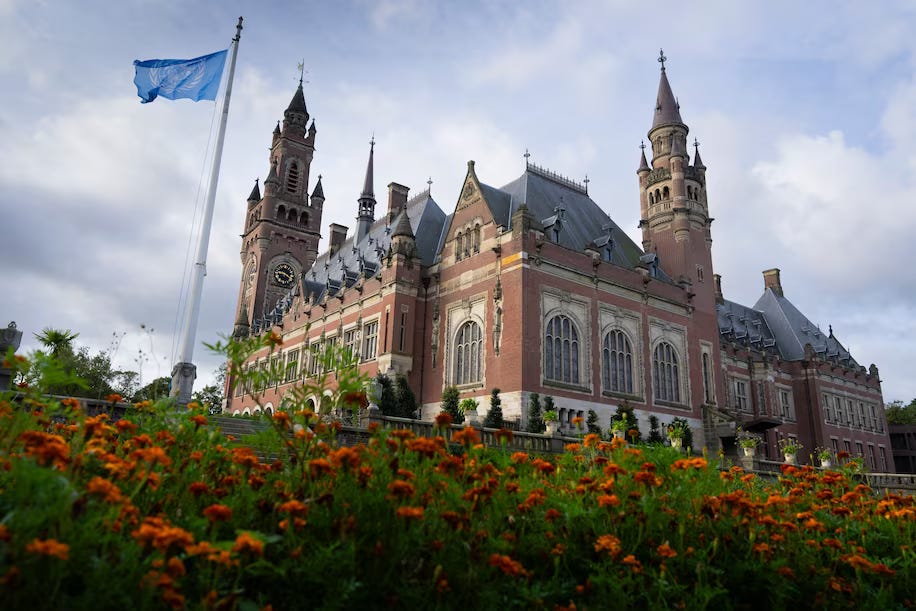ICJ Orders Israel to Cease Military Operations in Rafah and Safeguard Palestinian Rights
The order of the International Court of Justice, although not legally enforceable, carries considerable moral force in the current global scenario.
The ICJ has Delivered its Detailed and Final Judgment
The International Court of Justice (ICJ) on today (24th May, 2024) delivered its detailed and final judgment in the case of South Africa v. Israel regarding allegations of genocide in the Gaza Strip, categorically directing Israel to immediately cease military operations in Rafah and safeguard Palestinian rights. This 13-2 judgment follows the Court's interim orders passed in January and March, which had already mandated several provisional measures. The final order has significant implications for international law and the ongoing Israel-Hamas conflict in Gaza.
The Order Passed by the ICJ
Background and Chronology
The case, "Application of the Convention on the Prevention and Punishment of the Crime of Genocide in the Gaza Strip (South Africa v. Israel)," involves South Africa accusing Israel of violating the Genocide Convention in Gaza. Proceedings began on 29 December 2023, with South Africa invoking Article 36 of the ICJ Statute and Article IX of the Genocide Convention. Both countries appointed ad hoc judges: South Africa chose Mr Dikgang Ernest Moseneke, and Israel chose Mr Aharon Barak.
Initial Provisional Measures (26 January 2024)
In January, the ICJ ordered Israel to prevent acts of genocide, ensure military compliance with these measures, facilitate humanitarian aid, and preserve evidence of genocide. South Africa later requested additional measures due to deteriorating conditions in Gaza, particularly Rafah.
Further Developments and Orders (28 March 2024)
The Court reaffirmed its previous measures and added requirements for Israel to cooperate with the UN for humanitarian assistance and to submit regular compliance reports. Although Israel reported on its compliance, South Africa sought modifications, citing worsening conditions and ongoing military offensives in Rafah.
Request for Modification (10 May 2024)
On 10 May, South Africa requested the Court to order Israel to cease military operations in Rafah, ensure unimpeded access for humanitarian aid, and facilitate the work of investigators and journalists. Israel opposed this, arguing the existing measures were sufficient and that its military operations were necessary for security.
Court's Observations and Conclusions
The ICJ examined whether there had been significant changes in the situation since its previous orders. The Court found that conditions in Rafah had indeed worsened, leading to large-scale displacement and severe humanitarian impacts. Given the substantial risk to the Palestinian population, the Court deemed further provisional measures necessary.
Final Provisional Measures (24 May 2024)
The ICJ's final order included several critical measures:
Halt Military Offensive: Israel must immediately halt its military offensive in Rafah.
Ensure Humanitarian Aid: Israel must ensure the Rafah crossing remains open for humanitarian aid.
Facilitate Access for UN Bodies: Israel must facilitate access for UN investigative bodies to Gaza.
Compliance Reporting: Israel must report back within one month on measures taken to comply with the order.
Supported by a majority of thirteen judges with two dissenting, the ICJ emphasized the binding nature of its orders and the immediate need for Israel to comply to prevent further harm to the Palestinian population.
Israel's Official Response
Joint Statement by the Head of the National Security Council and the Spokesperson of the Ministry of Foreign Affairs
Israel responded strongly to the ICJ's judgment, stating: "The charges of genocide brought by South Africa against Israel at the International Court of Justice in The Hague are false, outrageous, and morally repugnant.
Following the horrific attack against the citizens of Israel on October 7th, 2023, Israel embarked upon a defensive and just war to eliminate Hamas and to secure the release of our hostages. Israel is acting based on its right to defend its territory and its citizens, consistent with its moral values and in compliance with international law, including international humanitarian law.
Israel has not and will not conduct military actions in the Rafah area which may inflict on the Palestinian civilian population in Gaza conditions of life that could bring about its physical destruction in whole or in part.
Israel will continue its efforts to enable humanitarian assistance and will act, in full compliance with the law, to reduce as much as possible harm caused to the civilian population in Gaza.
Israel will continue to enable the Rafah crossing to remain open for the entry of humanitarian assistance from the Egyptian side of the border and will prevent terror groups from controlling the passage."
This statement was released verbatim on Twitter, highlighting Israel's stance on the ICJ's allegations and measures.
Analysis and Conclusion
Although the ICJ's order may not be legally enforceable in the current international framework, it carries substantial public relations and rhetorical weight. The judgment effectively labels Israel as an aggressor, which could influence international opinion and diplomatic relations. Israel's response, while firm, also shows a willingness to cooperate with the global community by ensuring humanitarian aid and maintaining open crossings, which provides a glimmer of optimism.
Additionally, the official prosecutor's call for arrest warrants for the top leadership of both Israel and Hamas adds another layer of complexity. This detailed order from an independent body under the UN's auspices could serve as leverage for the United States, a staunch ally of Israel, to persuade it to agree to an immediate ceasefire. The ongoing legal and diplomatic efforts highlight the critical need for a resolution to the humanitarian crisis in Gaza.







Orders are appreciable
But there will be no use because no-one will agree